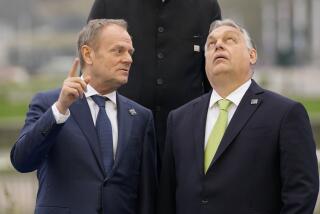Ex-East Bloc Nations Meet to Forge Regional Alliance : Europe: Hungary, Poland, Czechoslovakia discuss an economic and security agreement. But they face deep-rooted differences.
- Share via
BRATISLAVA, Czechoslovakia — Solutions to Central Europe’s troubles were easier to come by in 1364, the last time the Czechoslovak, Hungarian and Polish heads of state tried to forge a united economic and security policy for the region. The three kings, meeting in Krakow, agreed to scrap tariffs and trade barriers after an evening of talk, good food and a little wine.
Polish Prime Minister Tadeusz Mazowiecki on Monday reminded his negotiating partners from Hungary and Czechoslovakia of the successful pact among their forebears more than six centuries ago.
But Monday’s effort to link the three most reform-oriented nations of Eastern Europe in a new economic and defense alliance stalled over their differing states of readiness for integration with Western Europe and over the future of their relations with Moscow.
Age-old ethnic conflicts that threaten many of Europe’s fragile new democracies also prevented any major advance on the road to regional unity.
Czechoslovak President Vaclav Havel called the Bratislava meeting to discuss how the three nations might voluntarily cooperate, now that the alliances of the Warsaw Pact and Comecon that bound them under socialism have begun withering.
In an opening address to the presidents, prime ministers and foreign ministers, Havel proposed that a new European security commission be created this year, based in the Czechoslovak capital of Prague.
Mazowiecki, however, reportedly pressed for such an institution to be based in Warsaw, to bolster the Polish state that is wedged between the Soviet Union and a new economic superpower forming to its west as the Germanys reunite.
Havel also brought up the idea of Hungary and Czechoslovakia joining in an Adriatic trade bloc with Austria, Italy and Yugoslavia.
“The Poles know they do not belong to this historical alliance of Alp-Adria, but they fear they could be left out of a new integrated European community without it,” Havel noted in his speech.
Polish Foreign Minister Krzysztof Skubiszewski said that such a southeast European alignment would not be a problem for Poland, which he says enjoys good relations with the Adriatic and Alpine states.
Poland has been discussed as a potential partner in a regional alliance with Scandinavia. But its severe economic problems, foremost among them a foreign debt approaching $40 billion, might frustrate its integration with prosperous nations like Sweden and Norway.
Czechoslovak Foreign Minister Jiri Dienstbier said officials from the Central European corridor would gather again in a few weeks to discuss how they might move the security commission plan forward.
One awkward drag on the talks Monday was the lame-duck status of the Hungarian delegates. Sunday’s elections in Hungary made clear that Foreign Minister Gyula Horn would leave his office soon, as will Prime Minister Miklos Nemeth and, eventually, interim President Matyas Szuros. The three were sent to represent Hungary at the Bratislava talks.
A particularly sensitive point for the three national delegations was the question of their foreign relations, especially with the Soviet Union that once dominated them.
Havel suggested that Soviet President Mikhail S. Gorbachev’s reforms might be losing momentum and questioned whether Lithuanian’s thwarted attempts to break away might complicate Eastern Europe’s relations with the Soviet Union.
Polish President Wojciech Jaruzelski warned against “adopting a missionary tone” with Moscow, stressing the need to maintain good ties with the superpower as well as defending the right to self-determination for Lithuania.
While no agreements were reached at the Bratislava conference, participants deemed it an important first step to strengthening ties in the region.
More to Read
Sign up for Essential California
The most important California stories and recommendations in your inbox every morning.
You may occasionally receive promotional content from the Los Angeles Times.














